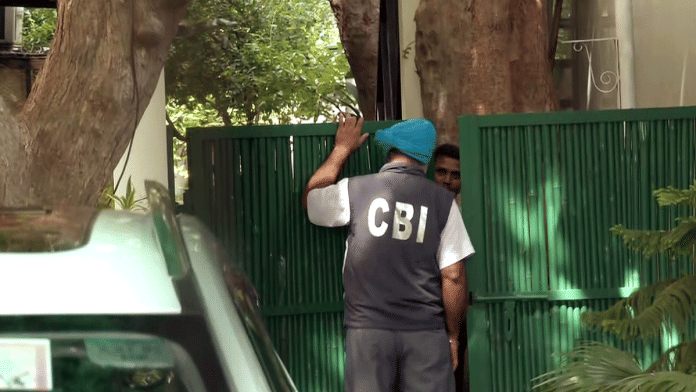New Delhi: Underlining that CBI investigations are an extraordinary measure justified in rare circumstances only, the Supreme Court has set aside an order of the Allahabad High Court directing such an inquiry into the alleged irregularities surrounding the recruitment process to the UP legislative council and assembly secretariats.
“The exercise of such power by the High Court or by this Court must be made sparingly, cautiously and in an exceptional situation when credibility of investigation is in question and to repose confidence in Investigation,” a bench of Justices J.K.Maheshwari and Vijay Bishnoi said Thursday, giving examples of circumstances such as state agencies being compromised or fundamental rights being at stake.
Such an enquiry should not be passed in routine manner on mere allegations levelled by the parties, it said, adding that the incident should have some national or international ramifications, and there must be some intention to do complete justice, or enforcing fundamental rights.
“Mere sweeping remarks are not enough to direct for CBI investigation, until prima facie disclosure of commission of criminal offence is made out. It is further said that in the matters relating to recruitment, it would not be appropriate to direct CBI investigation in routine course unless the facts brought on record are so abnormal that shake the conscience of the court,” it said in a 29-page ruling.
The observations came while the bench was hearing a challenge to a common order passed by the Allahabad High Court and another order of the HC’s Lucknow bench from October, 2023.
The petitioners had challenged the selection to various posts, under the Secretariat of the Uttar Pradesh Legislative Council, which was notified through an advertisement in September, 2020.
Contending that the selection was unfair, unjust, arbitrary and unreasonable, they prayed for quashing of the 2020 advertisement and for holding of a fresh selection process, under the UP Legislative Council Secretariat Service Rules, 1976. They also sought a high-level inquiry into the alleged manipulation and favouritism in selection and appointment.
A single-judge of the HC ruled that future recruitments will be done through the Subordinate Selection Commission, while a two-judge bench later, ordered a CBI preliminary enquiry. Challenging this, the UP legislative council moved the top court.
Also Read: ‘Justice must be done & be seen to be done’—SC orders FIR against ex-CBI officers in 19-yr-old case
What court said
The power to order the CBI investigations or inquiries, the top court asserted, must be used “sparingly, cautiously” and in “an exceptional situation when credibility of the investigation is in question” so as to repose confidence in the investigation.
As for the allegations of favoritism and manipulation in the mains written exam, the court said that although none of the pleas sought a CBI probe, the HC had directed the CBI to conduct a preliminary enquiry, and to register the case as a PIL.
If such a direction is carried out, it would amount to entertaining a PIL against the order of the single judge, the apex court said, adding that it would fall foul of the prevalent rules and demands of propriety. The two-judge bench had in the interests of fairness in public employment acted on the veracity of the allegations cast on the selection process and ordered the inquiry, despite the parties not seeking one, the court noted.
“Be that as it may, it is well-settled that directions for CBI inquiry should not be ordered by the High Courts or this Court in a routine manner.” The law is well-settled that self-restraint must be exercised on the use of this extraordinary constitutional power under Articles 32 (Right to Constitutional Remedies) or 226 (the power of HCs to issue writs for enforcing fundamental rights and other legal rights) of the Constitution, it added.
A CBI investigation should not be ordered routinely or merely because a party has doubts or harbours a subjective lack of confidence in the police, the court said, adding that to invoke this power, courts must be satisfied that the material placed before it, discloses a prima facie offence which necessitates a CBI investigation.
Such an inquiry may be conducted to ensure the fundamental right to a fair, and impartial investigation, or when there are national ramifications or a central agency’s expertise is demanded, it asserted.
(Edited by Tony Rai)
Also Read: A Supreme Court order opens up district judge posts to young talent. What are the implications






